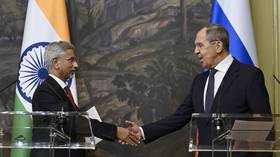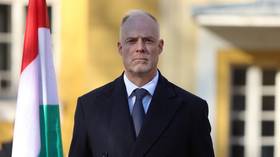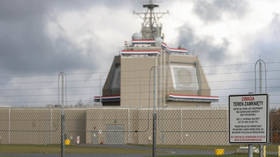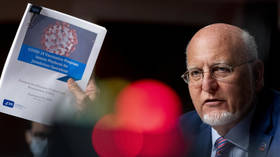Russia fueling Indian economic growth – Jaishankar

Russian natural resources are pivotal to India and its rise as the fastest-growing large economy in the world, Foreign Minister Subrahmanyam Jaishankar asserted on Monday.
Speaking at an event in Mumbai, India’s financial capital, Jaishankar emphasized that the nation’s purchases of Russian crude since the beginning of the Ukraine conflict in 2022 had triggered a debate, “because people were trying to pressurize us not to do it, but we held our position.”
Since the outbreak of hostilities between Russia and Ukraine, New Delhi has faced constant scrutiny from the West due to its robust trade and diplomatic ties with Moscow. Western officials and media have claimed that trade with India has allowed Moscow to “soften the blow” of sanctions imposed by the US, EU and their allies. Jaishankar and other top Indian officials have repeatedly underlined the need to foster relationship with Russia, not only because of historically close ties, but also because of the “pragmatic” needs of the nation of 1.4 billion.
🇷🇺🇮🇳 Russia is India's Fuel for its Firing Economy - JaishankarThe Indian EAM explains that Russia is much more than a long-time traditional partner for India - it provides resources for the world's most populous country and fastest moving economy.Power friends in more ways… pic.twitter.com/lCSiBvyAlk
— RT_India (@RT_India_news) May 13, 2024
“Today, Russia has become a big natural resource provider for India”, Jaishankar said on Monday. While annual trade between the two countries previously stood at $10-20 billion, it has skyrocketed to up to $70 billion, largely on the back of Indian oil purchases, the top diplomat noted. Indian refiners imported a total of 1.96 million barrels per day (bpd) of Russian crude in April, the highest since July of last year, according to reports in the Indian media.
Jaishankar underlined that trade ties between New Delhi and Moscow are not limited to crude oil and defense, as is commonly perceived. “We deal in oil, high-quality coal, metals of various kinds, and fertilizers,” he noted. He added that India has a pressing need for resources to “drive the momentum.”
The Indian economy is growing rapidly and is expected to become the world’s third largest by the end of this decade, behind only the US and China. Owing to continued growth, New Delhi has raised its gross domestic product (GDP) growth outlook for fiscal year 2023-24 from 7.3% to 7.6%. India is also set to become the world’s third-largest consumer market by 2026, according to the ‘India Economic Perspectives’ report by UBS. In 2023, India’s household consumption surged to $2.1 trillion, nearly double the previous decade, according to the report.
Speaking at another event on Monday, Jaishankar commented on friction with the West over oil trade with Russia. The diplomat claimed that New Delhi’s dialogue with Washington had caused a shift in the latter’s perception of India-Russia trade ties. He contrasted this with the “emotional” response among some European nations, which he believed could have been influenced by their proximity to the conflict zone.
Meanwhile, US Ambassador to India Eric Garcetti recently claimed that India’s purchase of Russian crude oil was “the design” of Washington’s policy. “They bought Russian oil because we wanted somebody to buy Russian oil at a price cap,” Garcetti said. “We didn’t want the price of the commodity to go up, they [India] fulfilled that.”
Where India Meets Russia – We are now on WhatsApp! Follow and share RT India in English and in Hindi













